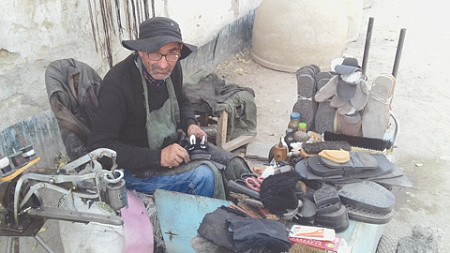Central Asia resistence to change
Despite the importance that the region has acquired from a geopolitical point of view, in the five countries that emerged from the Soviet fog at the beginning of the 1990s, obstacles to development remain, accentuated by increasingly uncertain migration and by the underground economy subject to widespread corruption and criminal organisations.
Astana (AsiaNews) - In a phase of great international change, which makes Central Asia one of the crucial regions of the new geopolitical equilibrium, the five countries that emerged from the Soviet fog at the beginning of the 1990s still show a lot of resistance to the new role demanded by history.
Despite attempts at opening up and reaching internal agreements and agreements with major international partners, there are still dangers to stability and obstacles to development, increasingly uncertain migration and the underground economy, subject to widespread corruption and criminal organisations.
Industry expert Andrej Zakhvatov, for the Radio Svoboda editorial team, has attempted to analyse the main factors that are still preventing Central Asians from escaping this fragile social and economic situation.
He observes that the upper echelons of power in these countries understand very well that the main threats to development do not come from religious extremism or water shortages, which are certainly significant issues, but not as intense as the unstoppable population growth, which causes migration and employment to become increasingly difficult.
As Zakhvatov reminds us, warnings about the constant drop in per capita income were already being issued in August 2006, when the first interparliamentary forum ‘Tajikistan-Russia: potential for interregional collaboration’, in a time that was still peaceful and constructive, when the prospect of a large unified labour market remained open between Moscow and Central Asia, entrusting the leadership to large Russian companies, especially in the construction sector. Discovering with amazement the novelty of Skype and remote communication, the delegates enthusiastically supported the possibilities of technology to bring order to the flow of labour migration, with consequent growth of the economy.
It was proposed to open hundreds of ‘broker points’ in the five countries, where it would be possible to arrange work in Russia for small sums of money, with all the necessary guarantees, but the initiative was soon forgotten. The following years have seen the multiplication of ‘nothing more than a pile of papers signed by well-paid bureaucrats’, observes the expert. While the continuous flow of labour migrants, which began immediately after the collapse of the Soviet empire, has not stopped increasing, in recent years it has encountered ever greater difficulties.
The flow of migrants in Russia has followed a rather rigid division: the markets were already occupied by Caucasians, and Central Asians have thrown themselves into construction sites, or at most into driving more or less legal taxis. The ever increasing restrictions during the war and the growing xenophobia in Russia, is today pushing migration towards other countries such as Germany, Great Britain, South Korea, Israel and even the United States, with rather adventurous routes, now destined to close due to Trump's policies.
The governments of Central Asian countries are frantically seeking new agreements with Moscow, to be able to regulate the groups of migrants in the Russian regions most in need of labour, overcoming the blockades at borders and airports for checks against extremism and terrorism, ensuring knowledge of the language, laws and history of Russia, and the rights of the Russian police towards migrants.
In Uzbekistan, publications are being circulated in the official press, suggesting ways to save money and invest it in jobs within the country, and a book has even been published with 200 recommendations for possible jobs and earnings, such as that of funeral directors to transport the deceased between the various countries in the region. In Tajikistan, domestic work remains largely ‘grey’ and unofficial, and in general it is estimated that more than 20% of work in Central Asia is undeclared. This means that the markets are essentially ruled by swindlers and criminals, leaving citizens without holidays or pensions, and without social protection, waiting for a bright future that never seems to get any closer.
07/02/2019 17:28







.png)










